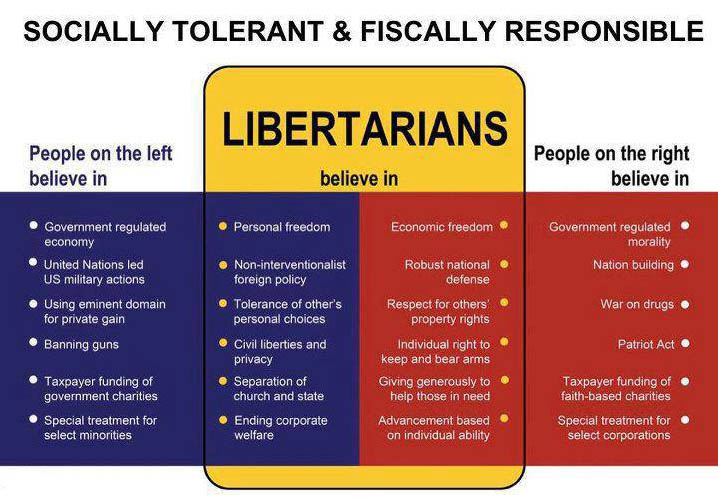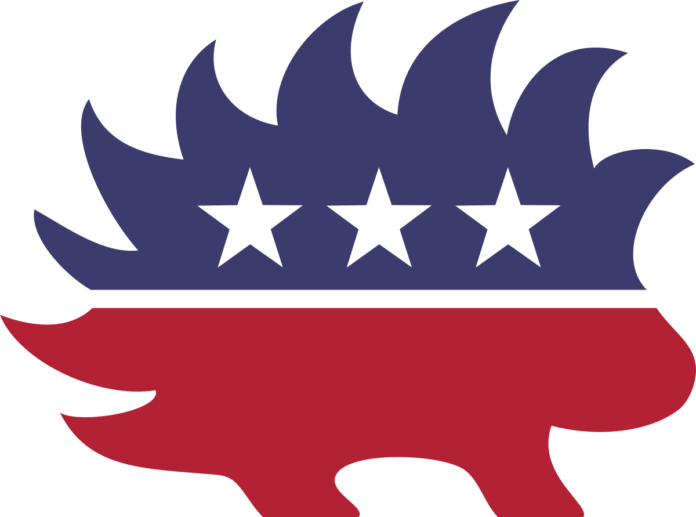Commentary From Your Libertarian Opinionizer
Some consider the US libertarian movement to be in shambles because of the constant infighting. The fact is there are many reasons for the infighting and its libertarianism’s own fault.
Assuming it’s a “fault” at all.
A primary reason for this perceived shamble situation is that libertarians consciously confiscated this Old World European term and tried to graft it onto a modern American concept in the first place. According to Wikipedia, “The first recorded use of the term libertarian was in 1789, when [English political writer and historian] William Belsham wrote about libertarianism in the context of metaphysics.”
From there several different people, including French communists, began using the new word to mean a new set of political positions. It was variously used by advocates or defenders of liberty, by admirers of French liberty under Napoleon Bonaparte and in the 1890s as a euphemism for “anarchism” after the French banned the use of all forms of that word in publications.
Thus the anti-government socialist movement replaced “anarchist socialism” with “libertarian socialism” to distinguish their brand of socialism from state socialism.
Yet even though throughout much of the world “libertarian” typically means “socialist” or some other form of collectivism, in the United States it came to mean a continuation of classical liberalism, laissez-faire capitalism and even, unfortunately, “socially liberal and economically conservative.”

The Libertarian political party was founded in the United States in 1971. The Libertarian name was chosen because (quoting Wikipedia again) “The Libertarian Party viewed the dominant Republican and Democratic parties as having diverged from what they viewed as the libertarian principles of the American Founding Fathers.”
Even without the European style “libertarian socialism” self-identified libertarians appear all over the political/philosophical map in the US today, disagreeing with nearly every meaning, definition, description, principle, concept and usage from anarchist to minarchist to voluntaryist to mutualist to agorist to anarcho-capitalist to free marketeer to post-statist.
Then add to that list that libertarians vehemently disagree whether America’s Founding Fathers were really “libertarian” or not.
And worse: They even accept, reject or modify the Non-Aggression Principle (aka Anti-Coercion/Non-Initiation-of-Force/Zero-Aggression Principle/Axiom/Maxim/Ethical Stance) against aggression, intimidation and fraud to such a degree that it becomes stripped of any cohesive meaning. This leaves collectivistic anti-individualist freedom-hating enemies able to counter with Orwellianesque Newspeak in which aggression is self-defense, intimidation is persuasion and fraud is honesty right alongside war is peace, freedom is slavery, libertarian is authoritarian and property is theft.
Little wonder that American style libertarianism is in a shambles and why so many political (capital L Libertarians) and philosophical (lower case l libertarians) are disillusioned.
However, even though the constant infighting has been going on for decades there is one perfectly good reason to remain optimistic. Inspired even.
Those libertarians who constantly call for their fellow libertarians to stop fighting amongst themselves and work together are wrong. The infighting, bickering and nitpicking is absolutely essential. Libertarians should keep refining, defining, redefining, disagreeing, deviating and diverging: libertarian vs voluntaryist vs minarchist vs agorist vs objectivist vs anarcho-capitalist vs free marketeer vs post-statist vs the next new twist that comes down the non-aggression pike like Alt-Libertarianism.
Why? Look to your political left. What you see there is constant infighting among left-wingers, Democrats, liberals, progressives, Democratic Socialists, social justice warriors, Antifa, egalitarians, communists and others of their ilk too numerous to define.
Look to your political right. What you see there is constant infighting among rightwingers, Republicans, conservatives, traditionalists, constitutionalists, patriots, religious fundamentalists and others of their ilk too numerous to define.
What all those ilks in all those directions—left, right, left-leaning, rightwinging, ultra left, far right—have in common is an intransigent dogmatic insistence that their own authoritarian collectivist idea of politics, of government, of country, of state should be forcibly imposed on everyone.
Now look at yourselves, libertarians. Your libertarianism whether philosophical or political is an individualist belief system, not a groupthink thing as offered up by the political righty and southpaw ilks. Ideas come from free minds, not from The Ultimate Collective of Star Trek’s “Borg.” Once the last free-thinking being is conquered and absorbed there is no future, only stagnation.
Call it infighting if you like but the constant commentary is a sign of a young, viable, vital, vibrant, vigorous, virtuous philosophy. Infighting is libertarianism’s strength, not its weakness. Infighting is a brain stimulant. Infighting is good!

Call yourself a Libertarian Party member, a minarchist, a classical liberal, an individualist, an Agorist, an Objectivist, a voluntaryist, a Misesian, a Rothbardian, an AnCap, an alt-libertarian, a post-statist and so on and on because, in the end, even the most deeply divided libertarians still have more in common with one another than they do with those authoritarian Others of the left and the right.
Infighting doesn’t shake it all up; infighting is what shakes it all out. If our libertarianism ultimately becomes dogma it will cease to be libertarian. It will be no better than left or right dogma in which everyone must conform to a single tyrannical “truth.”
Eventually it all comes down to a few simple choices no matter what people call themselves: individualism versus collectivism, freethought versus groupthink, authoritarianism versus libertarianism, self-ownership versus subservience.
The reason why libertarianism, specifically political Libertarianism and the Libertarian Party, are in such a shambles today is because so few people understand that politics is simply the practical application of philosophy. The philosophy must be firmly embedded in society before any politics based on that philosophy can be politically effective. The philosophy of libertarianism is still new and largely unknown or misunderstood by the majority of Americans. Even many advocates of libertarianism don’t really get it.
Many libertarians don’t like Ayn Rand or her Objectivist philosophy, yet she explained this whole concept very well in her writings:
“Politics is based on three other philosophical disciplines: metaphysics, epistemology and ethics—on a theory of man’s nature and of man’s relationship to existence. It is only on such a base that one can formulate a consistent political theory and achieve it in practice. When, however, men attempt to rush into politics without such a base, the result is that embarrassing conglomeration of impotence, futility, inconsistency and superficiality which is loosely designated today as “conservatism.” Objectivists are not “conservatives.” We are radicals for capitalism; we are fighting for that philosophical base which capitalism did not have and without which it was doomed to perish.”—The Chicken’s Homecoming, Ayn Rand essay from The New Left: The Anti-Industrial Revolution.
Two observations:
1. For a long time now too many libertarians have chosen to “rush into politics without such a base” with the result being the shambles that Rand describes.
2. By “capitalism” Rand specifically identifies elsewhere as “laissez-faire capitalism.”
What most libertarians don’t understand is that all the infighting they deplore is absolutely necessary as a means of working through and coming to an understanding of the metaphysics, epistemology and ethics upon which the philosophy of libertarianism must be based before the politics of Libertarianism can actually succeed.
Libertarians are still at the very beginnings of our movement. First—right now—comes the infighting necessary to ultimately identify and define the basic philosophical disciplines, which will eventually identify and define the libertarian philosophy, which only then can identify and define the politics of capital L Libertarianism.
The biggest complaint of non-cooperation seems to come from the Libertarian Party. “We all have to stop the infighting and start working together” is the familiar refrain.
The real problem is that there are just not enough libertarians in the total population yet. The only way to get the agreement libertarians want for their own in-group, whether they’re LPers or AnCappers or Post-Statists or whatever, isn’t by recruiting from each other’s in-groups, but by continually working to expand the entire Modern American Libertarian Movement. Every small in-group of libertarians will then expand their size by pulling from a bigger pool of like-minded people, many of whom will be supporters of several in-groups.
If libertarians ever stop infighting and become agreeable we won’t be libertarians anymore, we’ll just be lemmings like all the other ideologies.
Libertarian infighting isn’t a fault, it’s a feature. And a damn good feature at that. So jump in and enjoy it!
References and Links
The Problem of Libertarian Infighting Yes, most agree with this article: “It’s one thing to not give up your own personal beliefs and capitulating to the movement, it’s another to not unite against the enemy we all agree on.”
But Libertarianism is More Than Just Politics Here’s an alternative article to consider: “Perhaps we’ve become so desperate to see liberty in our times, that some of us haven’t caught on that liberty must be a long term project. We will not see the death of statism in our lifetimes”
Infighting is Just Another Name for Debating This is a basic introduction to the issue. As stated in this article “it’s often the case that libertarians come to very similar conclusions through completely different thought processes.” What’s wrong with that?




















